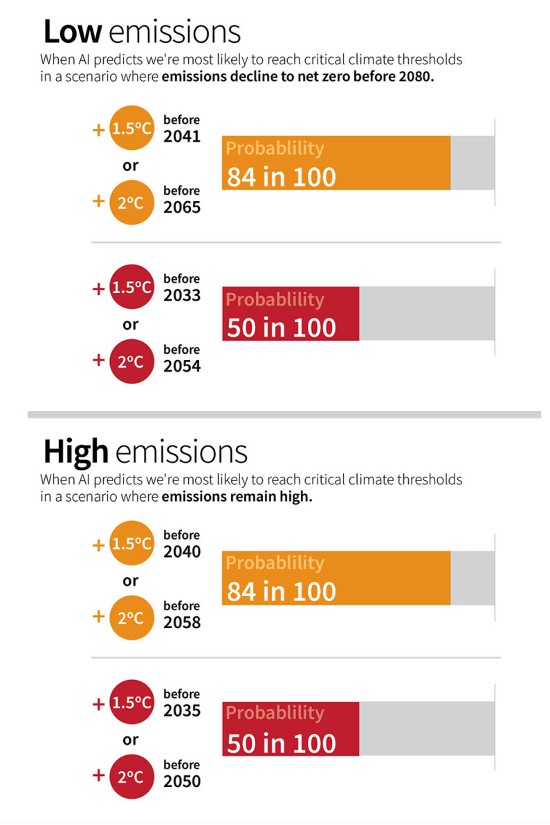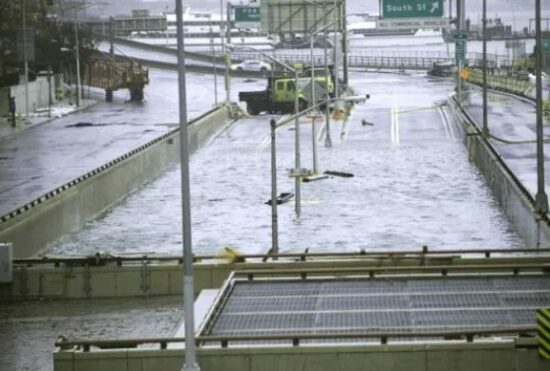Sometime in the next decade, the atmosphere of this planet will surpass a 1.5 Celsius (2.7 Fahrenheit) degree rise achieved in less than the last two centuries and attributed to human activity. It’s not just a forecast based on collected data points by climatologists, but also one that applied artificial intelligence is now forecasting.
The study using AI comes from Stanford University and Colorado State and appears in the January 30, 2023 edition of the journal PNAS, the Proceedings of the National Academy of Sciences for the United States.
The AI used is a neural network that has been trained using climate models and fed historical temperature observations. The neural network’s predictions on historic temperature shifts have been dead on which has provided the researchers with a sense of assurance that the AI’s future predictions are likely dead on.
What is the AI predicting? A forecast that has 1.5 Celsius being reached between 2033 and 2035. mean warming of the atmosphere will happen. The study concludes that “even if the climate forcing pathway is substantially reduced in the near term” which means regardless of what actions we take to reduce emissions between now and the mid-2030s, atmospheric temperatures will cross the 1.5 Celsius threshold with a “high probability of reaching the 2 Celsius threshold by mid-century.” A rise of 2 Celsius is equivalent to 3.6 Fahrenheit degrees hotter. The probability of reaching that threshold is weighted as four-in-five by 2060.
So how do you train a neural network to become a climatologist? The research team fed maps of annual mean temperatures including anomalies to it. The maps covered a geographic range of 72 degrees of latitude and 144 of longitude. The neural network then weighed the data input and minimized any perceived biases. Once trained on submitted data the neural network was asked to make sample predictions of temperature rise within a historic frame of reference outside the geographic parameters of the data input. These out-of-sample predictions validated the neural network’s capability of forecasting future climate change.
Noah Diffenbaugh, a Stanford climate scientist, and Elizabeth Barnes, an atmospheric scientist at Colorado State University, affirmed their belief that the world will hit the 2 Celsius rise even as emissions decline over the next several decades. Why? Because of the latency effect of carbon emissions already in the atmosphere. In other words, there already is a 2 Celsius rise built in that will play out by the time in question.
These findings contradict the consensus produced by scientists and policymakers who produce the Intergovernmental Panel on Climate Change (IPCC) reports. Their most recent predictions state that the 2 Celsius mark will not be reached if greenhouse gas (GHG) emissions can be drawn down to net zero before 2080.
Where is the thermometer now? The researchers used an acid test to see if the AI could predict that number. It did this by looking at the history studied between 1980 and 2021 data, stating that global mean atmospheric temperatures would be 1.1 Celsius (2 Fahrenheit) higher than pre-Industrial Revolution temperatures by 2022. That accuracy astonished Diffenbaugh who in a Stanford news release stated that he was surprised by the AI. He states “The fact that the AI has such high accuracy increases my confidence in its predictions of future warming.”
Going forward the AI has predicted atmospheric temperatures to have a one-in-two chance by 2054 of hitting the 2.0 Celsius threshold, and a two-in-three chance of crossing it between 2044 and 2065. The chart below provides a sample of the AI’s low and high prediction levels between now and 2065.

The only way to bend these odds means a concerted effort by all producers of GHGs to reduce the output of carbon dioxide, methane and other atmospheric-warming gasses from every aspect of their operations. It is no longer a question of meeting the lower 1.5 Celsius objective, but avoiding the 2 Celsius scenario with unintended and unpredictable consequences for the planet’s ecosystems.










[…] Even An AI Is Telling Us We Have Already Missed Making The Paris Climate Agreement 1.5 Celsius Targe… […]